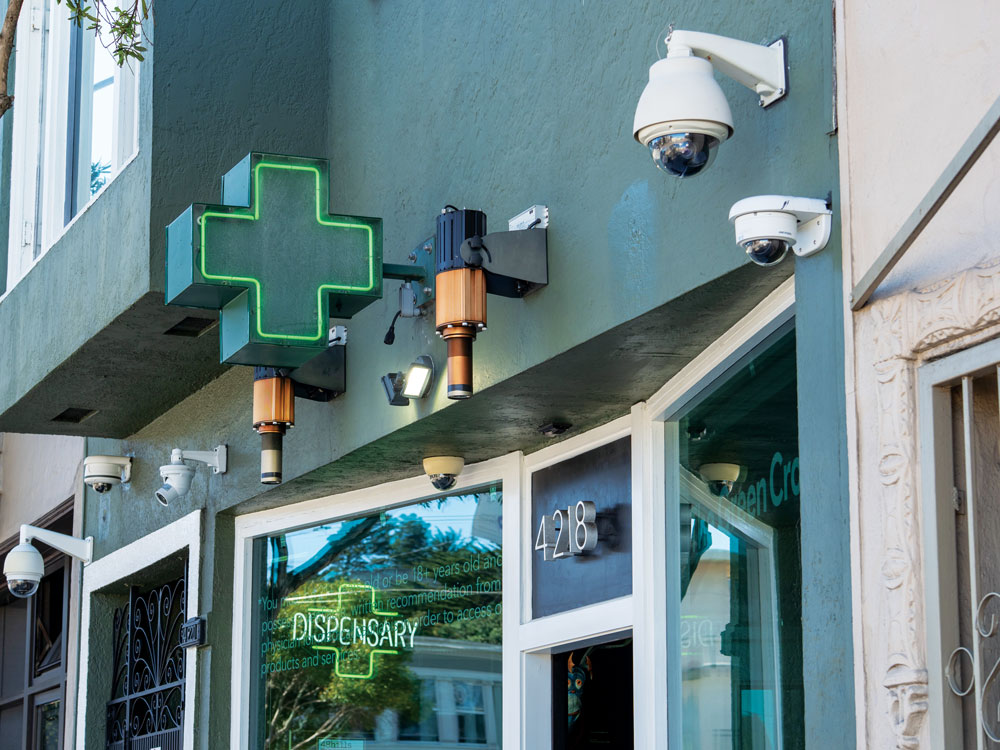A look at the state of security in the cannabis industry
Given all the recent burglaries and robberies of cannabis businesses up and down California, especially in the Bay Area, it might seem hard to believe, but the industry’s security situation has actually improved in some ways over the past couple of years.
James Vierra, CEO of Kingdom Protective Services, runs the Manteca-based Cannabis Security Group. He says that in the year or two after California legalized cannabis, a lot of his business came from offering cash-transfer services—bringing money to the bank and keeping it secure.
“Now, I won’t even take that business,” he says. “If some company hasn’t gotten its thing together and started accepting bank cards, I know they’re not really serious.”
It’s not easy for cannabis companies to set themselves up to accept electronic payments, but most of the bigger operations have now managed to do so. The reason it’s hard is that weed is still illegal under federal law. The biggest banks, and many smaller ones, are too fearful of liability to offer services to cannabis companies. If hauling sacks of cash to the bank were still common, the situation would likely be even worse than it is.
But it’s still pretty bad. On the weekend before Thanksgiving, at least 25 cannabis companies in Oakland—including dispensaries, distributors, and manufacturers—were hit by coordinated series of burglaries. The losses are estimated at $5 million. In 2019, during the protests over the police killing of George Floyd in Minneapolis, an even larger coordinated assault was mounted against cannabis companies from Seattle to San Diego, with more than 40 establishments hit. Oakland and Berkeley were the hardest hit.
What a lot of people don’t know, according to Amber Senter, is that in between those two massive crimes, one-off burglaries were, and continue to be, common. “We get hit all the time,” said Senter, who runs the incubator EquityWorks in Oakland and is a co-founder of Supernova Women, which represents women of color in Oakland’s cannabis industry. By “we,” she means all the cannabis companies in Oakland. But she also means EquityWorks itself, which was hit in the most recent major incident. EquityWorks supports small cannabis companies owned by people participating in Oakland’s social-equity program, which helps people hurt by the decades-long “war on drugs,” a leg-up in the industry, specifically people of color and those who had been incarcerated for pot crimes. Thieves don’t discriminate, unless you call “purposely targeting pot businesses” discrimination.
The Bay Area’s weed industry certainly calls it that. Senter and several other pot businesspeople in Oakland have asked the city to suspend or eliminate its cannabis tax and for the police to be more responsive to the industry. Oakland is widely considered to be America’s cannabis capital. Many people are worried it will lose that mantle as cannabis companies flee for friendlier locales.
In the meantime, cannabis companies can do a lot more to protect themselves, Vierra says. The challenge is the expense.
“The rule of thumb,” Vierra says, is that companies should expect to pay “between a half million and a million dollars a year” for adequate security: solid doors, cameras, lighting, guards. Too often, startups believe they can get away with going light on security.
“They present detailed security plans to the local government [when applying for a cannabis license],” says Vierra. “But 90 percent of the time, they don’t do what they promised to do.”








